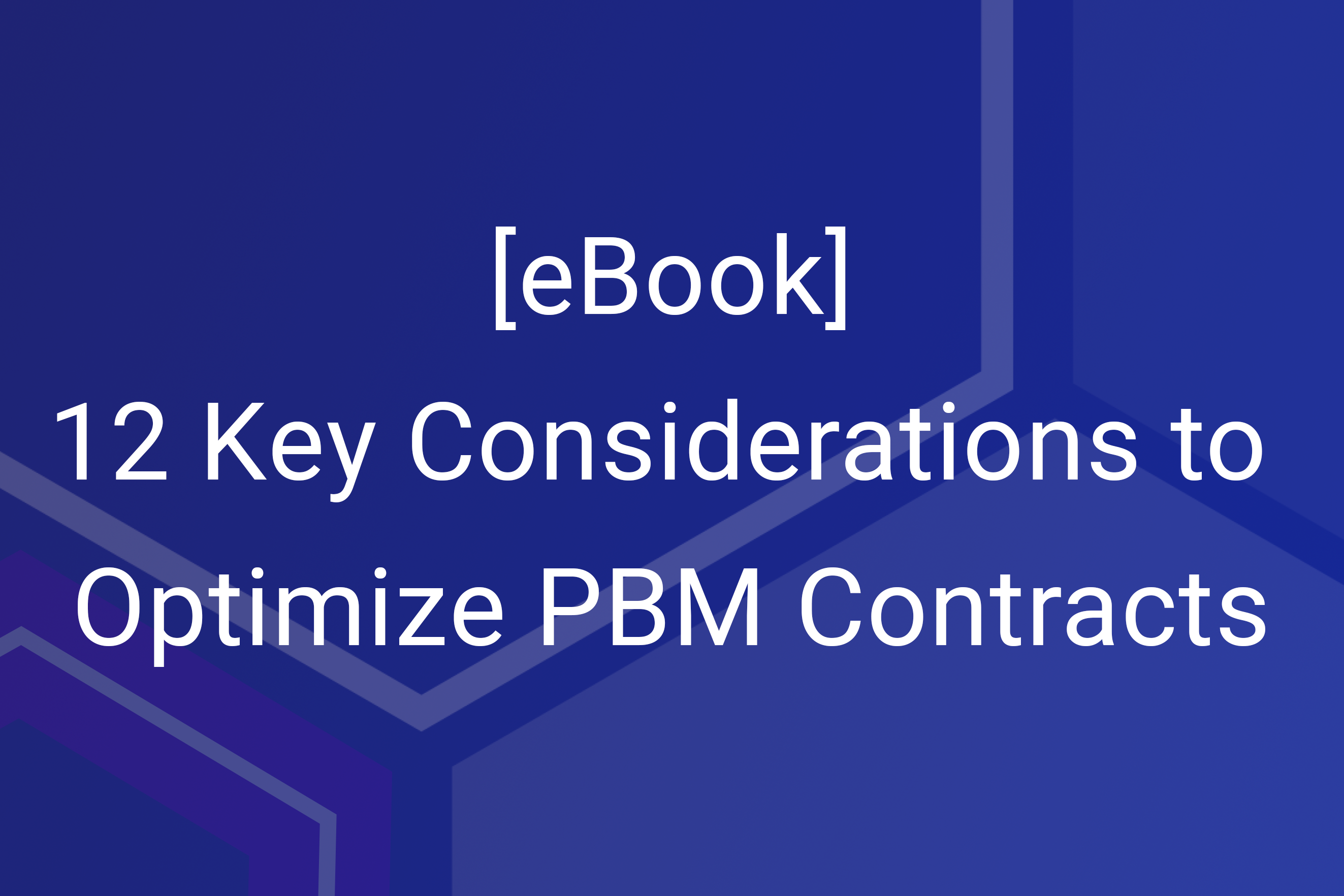In recent years, there has been increased scrutiny of Pharmacy Benefit Managers (PBMs) at the executive, administrative, and legislative levels across federal, state, and local governments. With 2024 being a presidential election year, political positioning and debate on how to solve the prescription drug cost problem has begun in earnest. The ongoing Federal Trade Commission (FTC) investigation of PBMs, ERISA preemption, the Inflation Reduction Act provisions, and multiple bills designed to improve pharmacy benefits transparency are just a few initiatives at play, reshaping pharmacy benefits and how PBMs conduct business.
In addition, with the recent, novel Johnson & Johnson class-action lawsuit alleging that the company failed to negotiate lower prices for their employee’s prescription drugs, it’s no surprise that PBM transparency is an issue that is top of mind for employers in 2024.
Since pharmacy legislation and reform are rapidly evolving, understanding the potential impact on employer plan sponsors is critical. In a recent Truveris webinar, “PBM Policy Spotlight: Federal and State PBM Transparency Initiatives,” Truveris VP Steve White was joined by Tish Pahl, Esq. at OFW Law to explore current legislative efforts, the potential impact on employers and their brokers, and proactive strategies for organizations to better manage pharmacy benefits and drive transparency in their contracts.
FTC Investigation Into PBM Practices
The FTC is currently conducting a formal investigation of PBMs that was initiated in February 2022, when they issued a Request for Information (RFI) on PBM best practices. The investigation is focused on areas such as vertical integration, pricing practices, and complicated and opaque methods to determine pharmacy reimbursement. In June 2022, the investigation was formalized when the FTC issued orders against 6 PBMs, and in 2023, the probe expanded to 3 Group Purchasing Organizations (GPOs).
One key area of focus includes the impact of PBM practices on independent pharmacies. In March of 2024, the FTC released a six B report with regard to the impact of large retailer practices upon independent retailers and experts say there will be a similar focus in the federal investigation.
In January 2024, Senator Grassley (R-Iowa) asked for an update on the status of the investigation. In response, FTC Chair Khan stated in a letter, “to date no company has turned over sufficient documents and data to be in full compliance with those orders.” With increased pressure for transparency and accountability from members of the Senate Finance Committee, we expect to see more developments on this investigation in the coming months.
Other Federal Efforts Aimed at PBM Transparency
In addition to the FTC investigation, there are several other federal initiatives around PBM transparency that have been in the news lately.
- Employment, Retirement and Income Security Act (ERISA) is a law that supersedes all state law regarding employee benefit plans, setting a standard of conduct for employers and requiring them to meet their fiduciary responsibilities as plan sponsors. ERISA has been in the spotlight recently due to the Johnson & Johnson class action lawsuit, which alleges that J&J violated their fiduciary duties under ERISA due to mismanagement of prescription benefits.
- The American Rescue Plan and Average Manufacturer Price (AMP) cap provision removes the existing limits on the maximum rebate that pharmaceutical companies must pay to Medicaid for specific drugs. The removal of the AMP cap means that the required rebate could potentially exceed the cost of a given drug. In this scenario, pharmaceutical companies could find themselves in the position of having to pay Medicaid when their drug is used, effectively selling at a loss. In response, PBMs have introduced rebate credits to offset reductions in rebates due to the lower list prices. For employers, keeping their pulse on price changes and understanding pharmacy contract language will be critical.
- The Medicare Drug Price Negotiation Act, a law that was enacted under the Inflation Reduction Act, enabled CMS to negotiate pricing with manufacturers. In August 2023, the U.S. Department of Health and Human Services (HHS) announced that 10 drugs covered under Medicare Part D were selected for negotiation. The new prices will be announced in September 2024 and go into effect in January 2026. Many pharmaceutical companies have been involved in litigation in several courts over this new requirement and the U.S. Supreme Court will ultimately decide whether these programs are unconstitutional or not. This may also trickle down to commercial plans, which could impact employer expenses for these drugs.
- A White House Summit was conducted in March 2024, where the White House held an event with pharmacy disruptors to address issues with PBMs. Notably, PBMs were not invited to the discussion.
- The Corporate Greed Task Force was also put into place in March 2024, as a cross-government group examining the impact of corporate greed and vertical integration within healthcare. The FTC and HHS have issued an RFI directed at GPOs and wholesalers to determine whether or not pricing practices of these entities are creating below-cost pricing for generic drug manufacturers, which has forced them to shutter and created drug shortages.
- A bi-partisan effort to reform PBM practices is also underway, aiming to pass multiple bills to improve PBM transparency, such as prohibiting spread pricing, increasing disclosure of PBM rebates and fees, and prohibiting service fees being tied to drug pricing.
Legislation at the State Level
In 2024, 155 bills in 40 states have been introduced so far for alleged PBM over-charging, unfair and deceptive acts and practices, and exorbitant practices. All 50 states have enacted numerous PBM transparency initiatives, including prohibitions upon gag clauses on pharmacies and requirements for transparency reporting, among others.
Additionally, 19 bills among 14 states were introduced this year which would allow states to import prescription drugs from Canada to lower costs. Florida is currently the only state that has an FDA-approved program. Others, such as Colorado have stalled, likely because the supply agreements with manufacturers do not allow wholesalers to export to the U.S. However, as of April 2024, vendors who are assisting individuals with importation have not been impacted.

How Employers Can Navigate PBM Policy Changes & Achieve Transparency
As employers and brokers look to understand the new and emerging PBM policies and the impact on their pharmacy benefits, there are steps they can take now to ensure transparency and hold PBMs accountable.
Consider the timing and process of contract procurement: If your PBM contract is expiring this year, it’s important get started on the procurement process as soon as possible. Starting early ensures you have the most leverage to negotiate the best contract possible. It’s also important that your procurement process includes a variety of PBM and pharmacy vendors, with an apples-to-apples comparison understanding how each vendor stacks against one another from a transparency standpoint.
Get a complete understanding of your contract: Pharmacy contracts are lengthy and complex. However, it’s important that you and your brokers understand the contract terms and conditions, guarantees and rebates, and overall PBM transparency. Read Truveris’ Guide to PBM Contract Terms eBook to understand the components of your PBM contract.
Ensure PBM contract transparency: Look for an independent expert pharmacy partner who can help you track the macro trends by staying on top of PBM legislation at national and state levels. Choosing an agnostic vendor without financial incentives or ties to PBMs will ensure an unbiased standardized comparison of contract aspects. For a deeper dive, reference our guide, 4 Innovative Strategies to Create Transparent Pharmacy Contracts.
Ensure contract oversight: Independent oversight of the plan sponsor’s contract terms is critical to ensure the PBM is adhering to the terms of their contract. Look for a partner like Truveris that can actively review and adjudicate every claim, reconcile financial guarantees, and provide confirmation of performance on an ongoing basis.

As PBM legislation and reform continue to evolve, staying ahead of the latest updates is critical to ensure transparency. To learn more about PBM legislation and the impact to your plan, watch our webinar, “PBM Policy Spotlight.”
Contact us to discuss how to drive transparency in your contracts.






